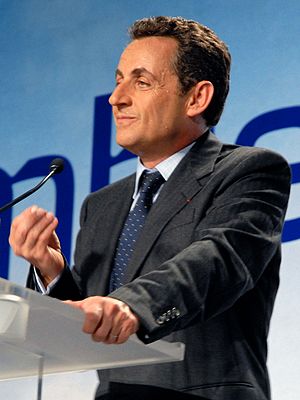 |
| Image via Wikipedia |
By Ségolène Allemandou
As he presented his party’s campaign platform ahead of next year’s presidential and legislative elections, French Interior Minister Claude Gueant laid down the gauntlet to the far right by hardening the government’s position on immigration.
“It’s easier for immigrants to integrate if there are less of them,” Gueant told Europe 1 radio. “It’s obvious that we need to better manage the flow of immigrants. For immigration to work, we need to be welcoming fewer immigrants each year.”The statement echoed the priority given to immigration issues during French President Nicolas Sarkozy’s successful 2007 election campaign. But it also rekindled accusations that the UMP, France’s ruling party, is trying to steal a march on France’s far-right National Front (FN) by playing the anti-immigration card.
According to recent opinion polls, the FN’s presidential candidate Marine Le Pen enjoys support ranging between 16% and 20% among French voters. For his part, the current president benefits from marginally less support than his main opponent Socialist Party candidate Francois Hollande, whom pollster LH2 gave 30% (a drop of nine points since he won the Socialist party primaries) in a survey last week.
As a result, Sarkozy - who has yet to officially announce his candidature - has a lot of ground to make up, especially among right wing swing voters.
“The UMP is once more taking up its 2007 strategy of hunting on FN territory”, Jerome Fouquet, co-director of the French pollster IFOP told FRANCE 24.Among the measures “for better management of the flow of immigrants” announced by Gueant are a toughening of the conditions necessary to obtain French citizenship and of the rules allowing an immigrant living in France to be joined by family members.
Other measures include increasing the number of expulsions of illegal immigrants and increasing the capacity of detention centres.
On November 27, Gueant announced that he wanted to reduce the number of legal immigrants coming to France annually from 200,000 to 180,000, a 10% decrease. (“Legal immigration” includes individuals coming to France on work and study visas and those seeking asylum).
After toughening the conditions on work and study visas, Gueant announced last week reforms to the asylum system in France, including a reduction in the asylum budget and a shortening of the time frame during which asylum applications have to be made. Currently, the asylum budget allows for 21,500 places in reception centres, 20,000 emergency lodgings and temporary social benefits for another 37,000 asylum seekers.
The reforms would also expand the list of “safe” countries, whose citizens would no longer qualify for asylum in France.
Voters’ concerns on economy and immigration











![Reblog this post [with Zemanta]](http://img.zemanta.com/reblog_e.png?x-id=d60a68de-5546-4371-ac64-ed4a4d8f904f)





 Join our page
Join our page

